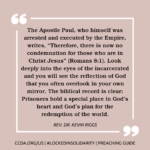New Year reflections for ministry leaders
“Come away to a deserted place all by yourselves and rest a while.” (Mark 6:31, NRSV)
When Jesus spoke those words of reward and guidance to his apostles, they had just reported back to him about their most ambitious training venture to date. He had sent them out in pairs to proclaim the rule of God throughout Galilee, charging them to move among the people, to be their guests, to heal their sick, and to teach all who would listen. Clearly, they had done well in their work—so well that they didn’t even have the leisure to stop and eat.
It should not be hard for CCD practitioners to identify with this picture!
How often do we find ourselves pushed to the edge of burnout? How often have we barreled down a path of ministry that led to exhaustion and collapse, then had to figure out when and how we got sidetracked, how we came to be at odds with ourselves, each other, and God?
Jesus’ words give us insight into the spiritual practices that shaped his approach to forming the leaders who would soon shepherd the birth of the church and oversee its launch into history. If they were to succeed, they would need to learn practices that would nurture and revitalize their identity, their relationships, and their faith in and obedience to God.
So what practices can we glean from this passage to nurture and revitalize us as CCD practitioners?
“Come away to a deserted place.” Almost identical words appear in Mark’s first chapter, where Jesus rose in the predawn and “went out to a deserted place”—a quiet and solitary place—where frantic disciples eventually found him at prayer (Mark 1:35). One element of our spiritual formation must be to practice seeking out settings that are free of any outside stimulus, places that foster an inner simplicity so God can fill us.
“All by yourselves.” Jesus wanted the twelve to absorb what they had just been through before going headlong into something new. They needed time alone together while all was still fresh to fathom the mystery of what God had just done among them. By sharing solitude we can do more than just evaluate our experience. We can reflect on it reverently and steep ourselves in its mystery.
What followed that day illustrates what happens when we don’t know how to reflect on our experience reverently. First they were swamped by thousands of people who needed healing and teaching, who needed to be organized and fed. Then, when Jesus sent them off in a boat at day’s end, they were almost swamped by waves on a dark sea. Even though he returned to them over the water and calmed the winds, Mark says that they were beside themselves, unable to take it all in—that “their hearts were hardened because they did not understand about the loaves.” They did not yet know what to do with the experience of mystery.
The practice of solitude to contemplate mystery is what gets us out of our heads and into our hearts. There is no contradiction in living lives of contemplation and action. Steeping ourselves in what St. Paul calls “this mystery, which is Christ in you, the hope of glory” (Col. 1:27) is a powerful way to make ministry transformative and not merely efficient.
“And rest a while.” A retreat intended for the twelve became a day of rest for the harried masses in the wilderness. Later, after hours of “straining at the oars” the twelve were finally able to rest in the gift of Christ’s presence.
Rest is a Sabbath practice, and a little bit of Sabbath can go a long way. When we’re doing Christian Community Development work, we need the rest that leads to life in the Holy Spirit, and away from stagnation and death.
Martin Luther King Jr.’s friend Rabbi Abraham Heschel said that the Sabbath is the one day of the week when a rabbi doesn’t have to prove that he is a good rabbi. And we can add that Sabbath is the one practice that saves a CCD ministry from having to prove that it is a good ministry.
As you prepare for a new year in ministry, you may wish to review your use of these practices. Ask yourself: What are my deserted places to go away to? How can I practice solitude alone and with others? How attentive am I to the mystery of Christ’s presence in and around me? How have I practiced Sabbath?
Ron Spann is a founding member of CCDA and serves on the CCDA advisory board. He is the director of the Spirituality Center at Christ Church Grosse Pointe in Grosse Pointe, MI. A licensed Personality and Human Relationships (PRH) educator, he also serves on the faculty of CREDO, a clergy wellness initiative of the Episcopal C





